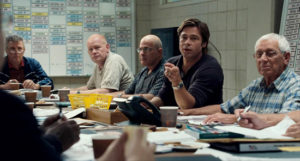 But I will pay very close attention to the sound categories next year when the awards go out because the folks who made “Moneyball” better get some serious consideration for how they used sound … or the lack of it … to help create the narrative in this outstanding movie.
But I will pay very close attention to the sound categories next year when the awards go out because the folks who made “Moneyball” better get some serious consideration for how they used sound … or the lack of it … to help create the narrative in this outstanding movie.
We ended up seeing the movie near the end of its theatrical run. I have never read the book, but am familiar with the story and wanted to see how they translated it to the big screen. The writers did a wonderful job creating a character study of Billy Beane even if they did have to bend some truths to get there. By now, we all need to just accept that movies won’t always capture reality if we want them to entertain us.
Besides crafting a narrative which engaged people regardless of their interest in balls, strikes, WHIP or WAR, they took a line from Beane (I’d love to know if it’s really something he said) about the sound of losing and turned that notion almost into a vital character in the story. Silence represented the sound of losing for the talkative Beane and injecting long periods of silence into a movie can truly jar the viewer.
That’s why they deserve an Oscar for finding the right places for this trick and not beating it to death. They took what is an almost cliched comment from a competitor and turned it into a very effective narrative device.
The movie didn’t just get me with the sound issue, however. The performances of Brad Pitt and Chris Pratt led the way for an outstanding cast. They stood out for me even though I thought pretty much everyone did a really nice job. I know Art Howe is not happy with how he was portrayed by Phillip Seymour Hoffman, but I think most people who follow baseball can accept that a manager might just be a cantankerous codger. From what I read, it was not much different than the way he was portrayed in the book so it’s not like they created his crankiness out of nowhere.
Besides the cast and the use of sound, I also appreciated how they didn’t end the story with Oakland’s playoff loss. They took it through Boston’s attempts to sign Beane and his decision to stay in Oakland. That shows how, despite some stretching of the truth (and ignoring the importance of the A’s pitching staff in their success), the writers and producers understood this was about more than a few decisions made by the front office of one team in one season.
Some people will say that the Moneyball concept has not revolutionized baseball since Beane’s teams never won a World Series, but it’s hard to deny that the ideas have given a lot of people pause about how to evaluate players. Maybe Beane (and the many others not depicted in the movies who espoused the Bill James philosophy prior to the Oakland story – Beane didn’t invent this stuff) haven’t pushed the old school completely out of the game, but they certainly have started a new debate within the game, which is good for everyone. People who are more into it will probably have more to say about it, but I just know that the topic seems to have revived interest in at least arguing about baseball.
Besides, you know the coach in the movie who argued Scott Hatteberg would have trouble playing first base? That’s Ron Washington. He now manages the Texas Rangers, who have been to the World Series the last two seasons. Washington likes Beane and credits him for giving Washington a chance as a coach, which led to his managerial success. But Washington is not a big proponent of Beane’s philosophy. The battle within baseball continues. That’s why this movie succeeded.

1 thought on “Money Shot”